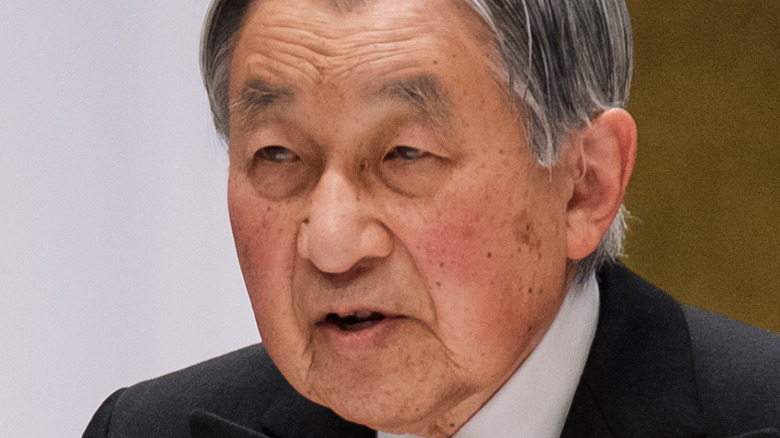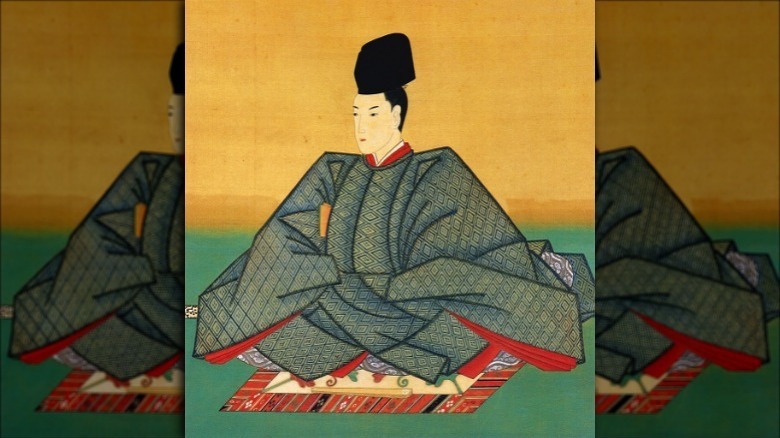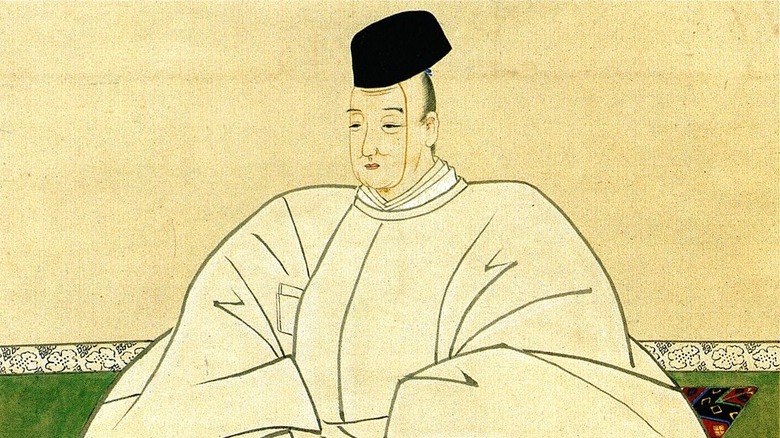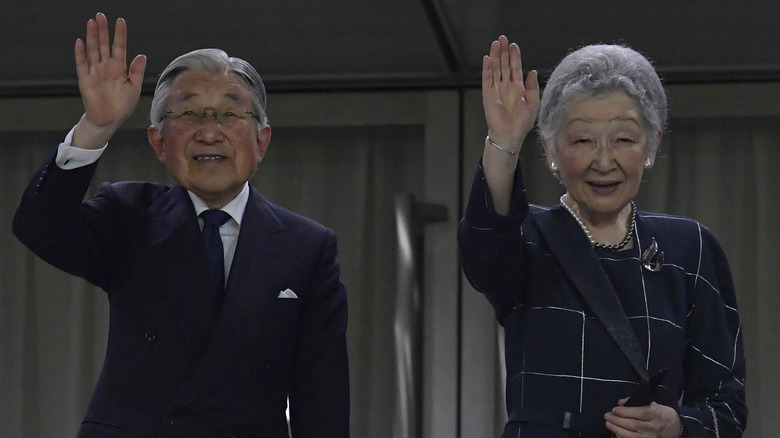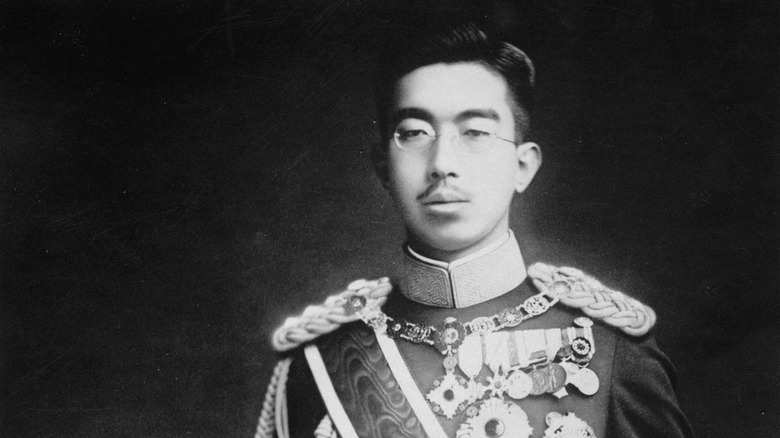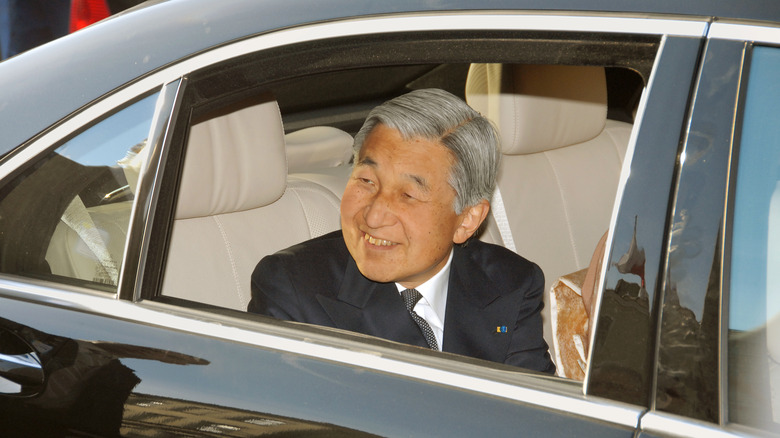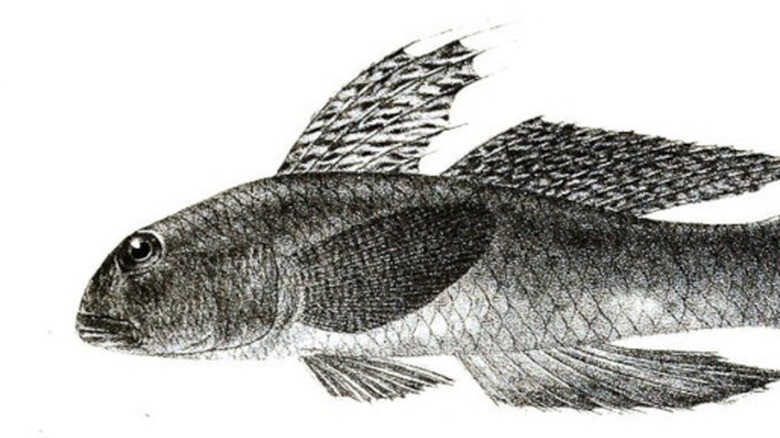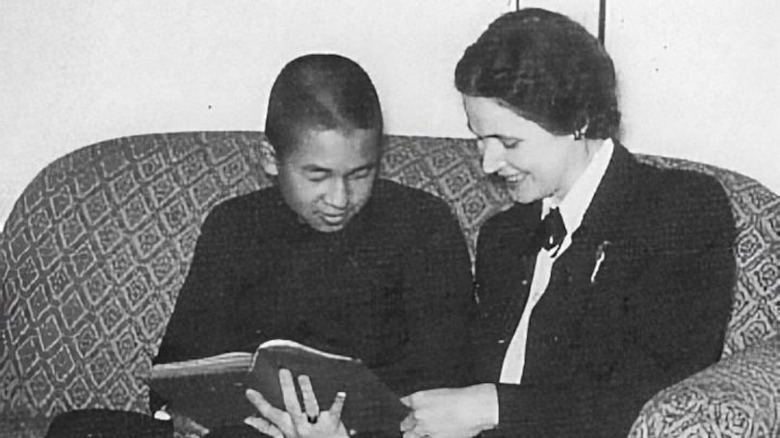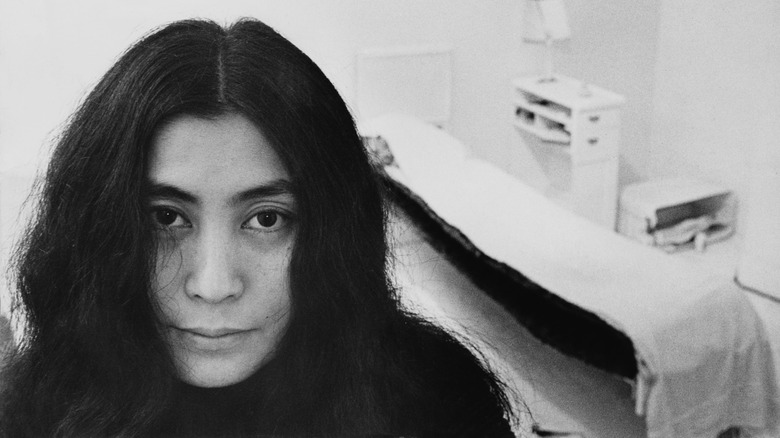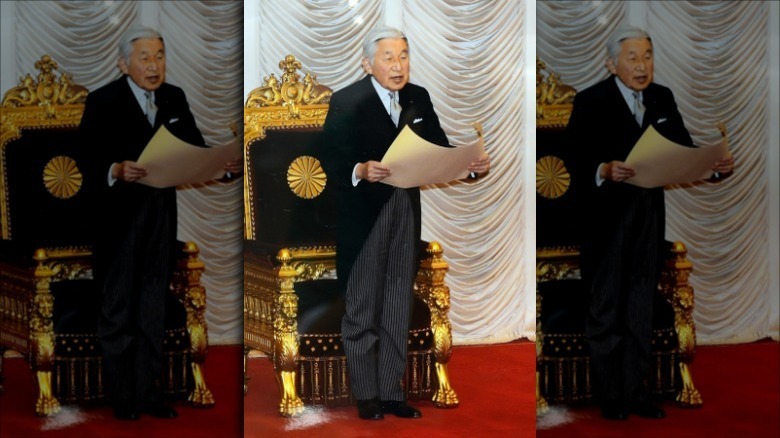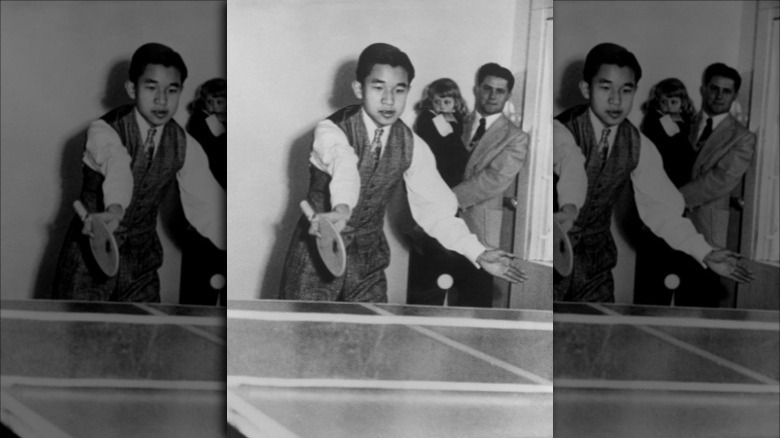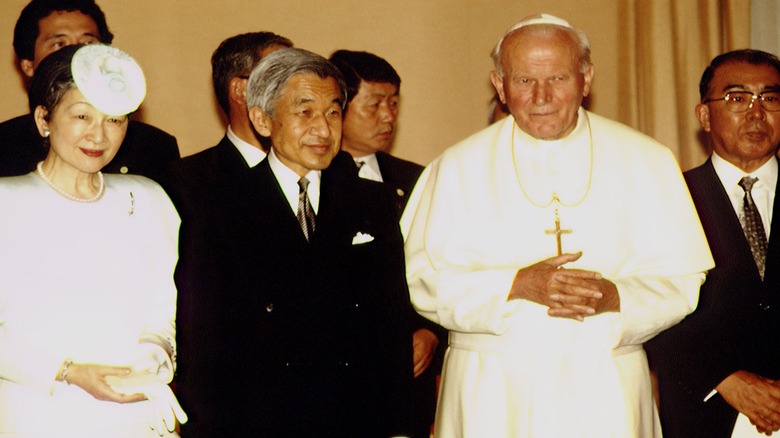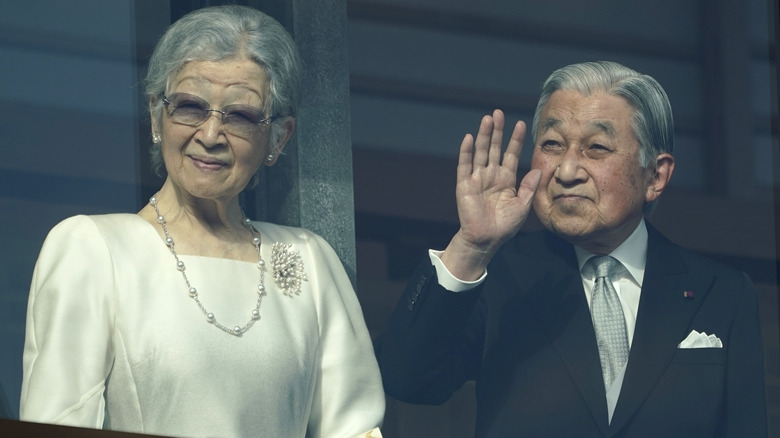The Untold Truth Of Emperor Akihito
In the context of history, it wasn't that long ago that Japan as a society was largely closed off from the rest of the world. For many Westerners, there's still a lingering sense of mystery around Japanese culture and history, and one of the most opaque aspects of that culture is the Japanese imperial family. In particular, the occupant of the Chrysanthemum Throne — the emperor of Japan.
For the vast majority of people alive today, the emperor of Japan was Tsugu Akihito. Akihito ascended to the throne in 1990 upon the death of his father, Hirohito, who reigned during Japan's disastrous involvement in World War II (and whose level of responsibility for that military aggression remains hotly debated). Akihito was a very different monarch from his father in many ways, but he remained largely unknowable to the wider public. His public image was of an elegant, smiling, silver-haired man, and that's where most people's knowledge of Akihito ended.
But the emperor of Japan is a human being just like everyone else, and there are levels to Akihito most of us aren't aware of. In fact, he has been a remarkably unique occupant of the Chrysanthemum Throne in many ways. Here is the untold truth of Emperor Akihito.
Akihito descended from an ancient family
For Americans, the concept of old is a difficult one. Our nation itself is less than 250 years old, though the indigenous civilizations we displaced are much older than that. And even the empire we broke away from only dates back a little more than 1,000 years.
Emperor Akihito was the 15tht emperor of Japan. As BBC News points out, Akihito's family line goes back at least a remarkable 2,600 years, making it the oldest unbroken hereditary monarchy in world history by a wide margin. The Brink offers a mind-blowing way to think about this: There has been exactly one imperial dynasty in Japan, the Yamato Dynasty.
The earliest history of the Japanese imperial house is shrouded in myth and mystery. The Culture Trip explains that its founding is traditionally dated to 660 B.C. when the first (and possibly mythological) emperor Jimmu ascended to the throne. But reliable historical records don't exist until the 6th century and Emperor Kinmei. Japan Zone notes that the earliest chronicles of the imperial family's origins date to the 8th century, and since they generally involve the sun goddess Amaterasu Omikami handing out imperial regalia, it's all a little dubious. But even if you exclude the first thousand years of Japan's imperial history, it's still the oldest monarchy in the world by a wide margin.
Akihito was the first emperor to retire in 200 years
According to NPR, in April 2019, Emperor Akihito became the first Japanese emperor to retire and abdicate in over 200 years. Surprisingly, The Washington Post reports that abdication was actually not unusual for the Japanese monarch in years past. There's even an official historical term for retired emperors: "daijo tenno," or "joko."
As Smithsonian Magazine notes, the last emperor to retire was Kokaku, who stepped aside in 1817 in favor of his son. But according to BBC News, the role of the emperor changed with the Meiji Restoration, a revolution of sorts in Japan that invested true (and total) political authority in the emperor. Essentially, it made it a lifetime gig, removing the ability to easily abdicate — a rule that persisted after the 1947 constitution that drastically remade Japan's government and society.
The modern constitution also bars the emperor from any sort of political involvement, forbidding him to even make "political statements" that might influence policy. Unsurprisingly, when Akihito first floated the idea of retiring in 2016 due to health concerns, he had to be subtle and indirect. After raising his concerns for his health and ability to continue to perform his duties, the Japanese legislature passed a special law allowing him to abdicate in favor of his son, who became Emperor Naruhito in 2019.
Akihito married a commoner
Emperor Emeritus Akihito was born in 1933. In "Japan's Imperial House in the Postwar Era, 1945-2019," historian Kenneth J. Ruoff notes that as crown prince, it was assumed Akihito would marry someone from the traditional Japanese aristocracy — even after it was officially abolished under the 1947 constitution. As noted by CNN, this was the tradition of the imperial family for more than 2,000 years.
But then Akihito met Michiko Shoda at a tennis game in 1957 and fell in love with a commoner. The Washington Post reports that there was a lot of initial resistance to the relationship, with many inside the imperial family trying to block the marriage. But CNN reports that the Japanese public became fascinated by Michiko, and the fateful meeting came to be known as the "love match." The Japanese media ran countless stories about the couple, and often stressed the democratic symbolism of the crown prince choosing his bride from "among the people."
Britannica notes that Akihito's son and heir, the current Emperor Naruhito, also married a commoner in a further distancing from tradition. But as ABC News explains, this may be more practical than romantic: There are few options for marriage with suitably aristocratic people for the imperial family. Indeed, the shrinking of the imperial family and the fading importance of the former nobility in Japan means marrying commoners may be the rule instead of the exception going forward.
Akihito was the first emperor not regarded as a god
Britannica tells that the Japanese Imperial family was traditionally regarded as being descended from the sun goddess Amaterasu. As noted by Time, the emperor of Japan was something of a figurehead for centuries, considered divine and too holy to have much to do with everyday politics or government. Indeed, the country was largely run by military leaders until the Meiji Restoration, which transformed the emperor into a powerful figure while retaining his divine pretensions.
After Japan's defeat in World War II, its constitution was completely revised, and the emperor's divinity was explicitly denied. But sitting Emperor Hirohito had ascended to the throne as a god. His son, Akihito, was therefore the first emperor of Japan to ascend to the throne explicitly as nothing more than a mortal man. Nevertheless, there were many in Japan who clung to the old ways and refused to acknowledge this. The Baltimore Sun reports that there was controversy in Japan around the expensive, secret religious ceremony Akihito took part in as part of his ascension.
The Daijo-sai ceremony is only witnessed by the imperial family and its retainers. In 1990 the government was forced to issue an official statement that no part of the ceremony proclaimed Akihito to be a god. When his son Naruhito ascended, the ceremony was repeated, and it remains very controversial due to its cost and secretive nature, per the Associated Press.
Akihito shunned the media
Emperor Akihito was born into a world that was much different than the one we know today. There was no public television in 1933, and when he ascended the throne in 1990 at the age of 57, the internet was still in its infancy, and social media was years away from being a thing. So it might not be too surprising that Akihito shunned most media. He was a very public figure — Britannica notes that he and his wife Michiko were well-known as world-travelers and "goodwill ambassadors" for their country. Still, they avoided the sort of appearances most politicians and royals are accustomed to. For example, BBC News notes that the first time Akihito appeared on television — which was the first time any Japanese emperor appeared on television — was in 2011 when he addressed the country in the wake of devastating earthquakes and tsunami. That was 21 years into his reign.
Part of Akihito's reluctance to engage with media platforms is the imperial image. According to Smithsonian Magazine, emperor is a ceremonial role meant to be apolitical and removed from public life — almost a religious figure. In 2014, when a schoolgirl snapped a photo of Akihito and Michiko while on a private trip and posted it to Twitter, there was an uproar because it was perceived by some as disrespectful and inappropriate, per The Japan Times.
Akihito's an expert marine biologist
For many people, the idea of being born into an ancient and wealthy imperial family means spending time on leisure. After all, what's the point of being emperor of Japan if you can't enjoy it? But Emperor Emeritus Akihito was never the lazy sort. Aside from performing his imperial duties with poise and grace his entire life, Quartz reports that he found time to become an expert marine biologist. He was a member of the Ichthyological Society of Japan until his ascension and published dozens of scientific papers in the society's official journal. He was even called upon to present his work at international conferences. Specifically, Akihito is recognized as a leading expert on gobies, a species of small, ray-finned fish. According to The New York Times, he's so well-regarded that one species of goby (Exyrias akihito) is named in his honor.
This scientific interest runs in the family. Akihito's father, Emperor Hirohito, was also a renowned scientist and considered an expert in jellyfish. Akihito never quite gave up his work, either. As noted by Open Culture, his most recent scientific paper was published in 2016 when he was 83 years old. The second author on the paper was his youngest son, Crown Prince Fumihito Akishino.
Akihito was raised by strangers
Tsugu Akihito was born into one of the oldest imperial houses in history, so it shouldn't be a surprise that his childhood wasn't a normal one. In "Japan's Imperial House in the Postwar Era, 1945-2019," historian Kenneth J. Ruoff reveals that Akihito was only raised directly by his parents until the age of 3. After that, author Ben Hills notes in "Princess Masako" that he was removed from their direct care and raised by a staff of tutors and nursemaids, seeing his parents only once a week under very formal conditions.
Akihito's childhood was spent almost entirely in wartime. In 1946, after Japan's surrender, The Los Angeles Times reports that a group of American educators went to Japan and met with Akihito's father, Emperor Hirohito. He requested a tutor for his son, and because he thought Akihito needed more feminine influences, he specifically requested a Christian woman. And she would have an enormous impact on the future emperor's life.
As The New York Times tells us, that woman was Elizabeth Gray Vining, a Quaker from Philadelphia. Vining's first interaction with the future emperor involved his name: She informed him that in her classroom, he would be known as "Jimmy." As a Quaker, Vining was a committed pacifist, and ABC News reports that many credit her influence with Akihito's pursuit of peace and calm during his reign as emperor. They remained in touch until Vining's death, even chatting on the phone in 1994 when she was 91 years old.
Akihito went to school with Yoko Ono
As noted by Old Tokyo, the Peers' School (Gakushuin) in Japan was originally founded in 1842 and intended to be a boys' school for Japan's imperial family and ruling aristocracy. A girls' school was founded in 1887, and the two merged into one school in 1906. In 1947, with the aristocracy abolished, the school became a private educational institution.
That year, Crown Prince Akihito was 14 and ready to begin his education in earnest. And so was another very famous Japanese citizen — Yoko Ono. As noted by The Gentlewoman, they both attended this elite school, and according to BeatlesHistorian.com, they were very good friends. But author Nell Beram notes in "Yoko Ono: Collector of Skies" that she developed a much closer relationship with Akihito's younger brother, Masahito (known as Yoshi), who had a bit of a schoolboy crush on her. Artlyst reports that a sign of Ono's rebellious nature surfaced when she visited Yoshi at the boys' school in violation of the rules.
The Gakushuin may not have been for the nobility anymore, but it remained academically rigorous. Per Quartz, Akihito went on to become a world-renowned marine biologist after graduating. And before becoming one of the most famous artists of the modern era, Ono was accepted into the school's prestigious philosophy department.
Akihito was a figurehead
Being emperor of Japan sure sounds good, but that's because you're imagining a classic kind — someone who has actual power. Emperor Akihito was a very different sort of emperor; he had no power, relatively little personal wealth, and a whole lot of symbolic importance. According to Time, that was traditionally the case. For centuries, emperors acted as figureheads, while military generals known as shoguns ruled in their name. In the 19th century, the Meiji Restoration reinvented the emperor as a much more powerful figure. After Japan's humiliating defeat in World War II, however, the emperor's role was once again reduced to figurehead status.
As explained by BBC News, as emperor of Japan, Akihito had no political power at all — his role was basically ceremonial. While he announced decisions in his name, they were actually made by government officials. The emperor is even forbidden to make any sort of "political statement" that might influence events.
And Akihito isn't even particularly rich. As noted by AP News, while the imperial family was once among the world's wealthiest people, after World War II, they were forced to transfer all of their assets to the Japanese government. The imperial family is supported by a state budget, of course, and Akihito received an annual salary as emperor that amounted to several million dollars. And while that's not a bad payday, it's not exactly the sort of world-class money you'd assume an emperor to have.
Akihito is a huge fan of tennis
One of the reasons the people of Japan — and the rest of the world — have always been charmed by Emperor Akihito is his normalcy. Instead of behaving like a weird, privileged emperor, he's always displayed a charming enthusiasm for very relatable pursuits and passions. A great example is his devotion to the sport of tennis.
As noted by AP News, Akihito's love for tennis served two purposes: It kept him fit, and it allowed him to meet and interact with people he would otherwise have never encountered. His lifelong friend Kazuo Oda believes that tennis gave the young crown prince confidence. Not only that, but the tennis court is also where a young Akihito met and fell in love with his future empress, Michiko Shoda. As noted by The New York Times, the story of Akihito meeting Michiko at a tennis game — popularly referred to as the "love match" — led to a nationwide craze for tennis.
In 2019, after retiring as emperor, The Japan Times reports that Akihito and Michiko returned to the tennis court where they first met in 1957. Akihito, now 87, no longer plays tennis but has reportedly switched to table tennis (ping pong) instead.
Akihito transformed the role of the emperor
When Tsugu Akihito was born in 1933, the emperor of Japan was a symbol of military power and authority. After Japan's defeat in World War II, the fate of the imperial family was in serious doubt. PBS notes that General Douglas MacArthur, in charge of the Allied occupation of Japan, was pressured to eradicate the imperial family. But MacArthur thought the government of Japan needed a spiritual base and decided to reshape the role of the emperor instead of eliminating it. Unfortunately, Emperor Hirohito, Akihito's father, was forged in an earlier time and was not the perfect instrument for this sort of change. As DW explains, Hirohito made attempts to modernize the imperial court and be more like a modern constitutional monarch but carried too much symbolic weight to be truly successful.
Akihito was able to make a break with the past and redefine what it meant to be emperor of Japan. As AP News notes, he chose a commoner wife instead of a member of the old aristocracy. And he and his wife, Empress Emerita Michiko, chose to raise their children themselves instead of leaving that to imperial servants, as was tradition. In addition, Smithsonian Magazine reports that Akihito's empathy and personal touch during disasters established the emperor as a positive, symbolic, and spiritual leader of the country.
Akihito's health is failing
Throughout his life and his 30-year reign as emperor of Japan, Akihito has become one of the most beloved figures in the country — and the world. His positive attitude and genuine approach to his role have endeared him to just about everyone, which made his decision to retire in 2019 a sad one for many. Unfortunately, there were good reasons for that decision, one being that Akihito is not a young man anymore. At 87 years of age, he's lived through a series of recent health scares that make his decision to step aside seem extremely rational. Notably, The Guardian reports that in 2002, Emperor Akihito was diagnosed with prostate cancer. His treatment was thankfully successful.
BBC News reports that a little less than a decade later, Akihito was once again in the hospital. He was 78-years old at the time and admitted with a fever and bronchitis and diagnosed with pneumonia. He was in the hospital for 18 days and, at one point, had a persistent fever of 102 degrees before eventually recovering. According to CBS News, Akihito underwent a successful heart bypass just a few months later. He again recovered fully, but the health scare prompted him to begin scaling back his schedule.
Akihito retired in 2019 in part due to his mounting health issues. In 2020, AP News reported that the emperor emeritus fainted at his private residence. Tests were inconclusive, and he appeared to recover fully.
